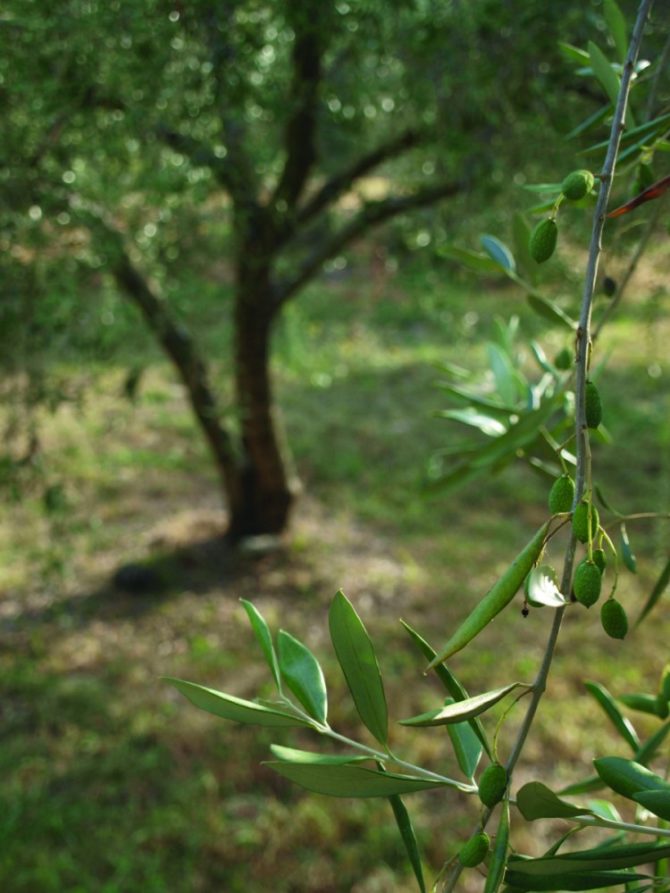Le Moulin d’Opio

Nestled amid olive trees in the gentle foothills between Grasse and Cannes, which locals call l’arrière pays niçois, lies the Moulin d’Opio, home to olive oil of unquestionable provenance. From humble origins in 1848, a thriving enterprise has been created by seven generations of the family Michel. Early one misty morning in October, I meandered up from the coast to meet family member Laetitia Agnello, who showed me the fascinating workings of the mill – ancient and modern.
The early wooden implements and mechanisms on display in the mill’s reception area are virtual antiques now, polished smooth with decades of wear. Pride of place is given to examples of the massive granite grinding wheels which are still used to turn the olives into paste – this method has remained largely unchanged since Roman times.
Balance of Power
By contrast, the Moulin d’Opio has been witness to revolutionary changes to the power source needed to drive the millwheels. The giant water wheel which sits proudly attached to the mill building is now a picturesque legacy of former days. When electrical motors were introduced in the 1930s, the fundamental requirement to site mills near a source of water was at an end. Although the Moulin d’Opio has upgraded its original technology on several occasions, and is consequently now the proud owner of a pretty sophisticated set-up, the mill is still very much about small-scale, non-industrial production.
The mill has grown into a thriving business with a range of designer- labelled oils, tapenades and other sauces and condiments, yet it is still very much at the heart of the local growers’ community. If you should ever buy a property here and find yourself the proud owner of a terrace of olive trees, then chances are that you would bring them to the Moulin to have your harvest turned into oil. You would be in good company – rumour has it that the King of Belgium has a country palace near here and brings his olives to the mill, alongside those farmers with more modest holdings.
The Daily Grind
It’s a surprise to find that the grinding stones are still the same solid granite wheels. This traditional method reduces the release of oil oxidation enzymes and ensures the highest quality output. After the olives are crushed and turned into paste, this is filtered out, the water content removed and, finally, only the greeny-gold olive oil is left. Quality is assured by the Appellation d’Origine Protégée of Nice and recent medal-winning achievements.
The mill sells a range of douce, fruitée and aromatique oils but I was especially keen to try the olive oil made from caillettes, the tiny Niçoises olives grown in this region, and also in Provence and Northern Italy. You may come across this particular variety in a salad or on pizza – it has great flavour but a small amount of flesh so beware of the hard stone – and the oil certainly didn’t disappoint. I tried several varieties but it was the virgin olive AOC (Appellation d’Origine Contrôlée) made from caillettes that was the star. It is classically deep green in colour and has a beautiful velvety texture which slides gently on your tongue. But then you get a surprising bite of pleasant peppery sharpness and a gentle aftertaste. I’ve used it since, on salads, pasta and grilled vegetables, and it really shows its quality – enhancing the food flavours on every occasion.
The Moulin d’Opio is located about 15 minutes from Cannes and Grasse, and is open most of the year. However, if you want to witness the production process itself you will need to visit between November and March, when olive harvesting generally takes place.
Le Moulin d’Opio, 2 Route de Châteauneuf, 06650 Opio. Tel:+33 (0)4-93-77-23-03. Email: [email protected]
Originally published in the February-March 2014 issue of France Today
Share to: Facebook Twitter LinkedIn Email
Leave a reply
Your email address will not be published. Required fields are marked *



